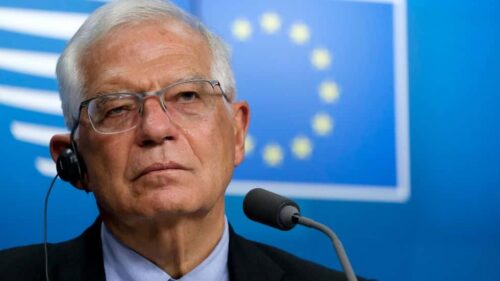US President Donald Trump was not alone in seeing in Elias Rodriguez’s crime a far bigger problem than the genocide the perpetrator denounced in his manifesto. On the morning following these murders, Trump posted his assessment on his Truth Social website: “These horrible D.C. killings, based obviously on antisemitism, must end, NOW!”
Trump predictably echoed Israeli Prime Minister Benjamin Netanyahu, who expressed his shock at the “horrific, antisemitic” act. Time magazine promptly published a piece by Anti-Defamation League (ADL) CEO Jonathan Greenblatt with the title: “The D.C. Jewish Museum Shooting Was Inevitable. The Time to Act on Antisemitism is Now.”
For Greenblatt, this “doesn’t come as a surprise” because the suspect was allegedly involved with “a range of radical causes.” Well ahead of the FBI, ADL researchers connected “Rodriguez, with a high degree of certainty, to a manifesto with the heading ‘Escalate For Gaza, Bring The War Home.’ They concluded ‘this was targeted antisemitism.’”
ADL draws its conclusion on the basis of “slogans commonly used by anti-Israel activists, particularly in more extreme, militant spaces“ such as “time to escalate.”
Today’s Weekly Devil’s Dictionary definition:
Anti-Israel:
- An increasingly common and historically comprehensible position of political opposition based on certain individuals’ moral condemnation of the extreme practice of apartheid, ethnic cleansing and genocide practiced by the state of Israel.
- A term equated with “antisemitic” by the Israeli government — but also by many in the US, Germany, the UK and elsewhere in the West — who see no problem with apartheid, ethnic cleansing, genocide and even mass starvation so long as it is practiced by the Jewish state.
Contextual note
Policing the English language to unearth antisemitic dog whistles has become an art form that appears to be evolving, perhaps even escalating. It’s good to know that all kinds of ordinary English words, like “escalate” may be cited as proof of deep-seated prejudices. Nevertheless, even in making this less than credible statement the ADL article proves more level-headed than Greenblatt when it correctly identifies these people as being “anti-Israel activists” without terming them antisemitic.
Among all nations, Israel possesses the exclusive privilege of being able to equate simple criticism — even of its most extreme, illegal and inhuman behavior — as a call for the total suppression of its people. Furthermore, it can reliably count on the president of the United States, whatever the party in power, and journals like Time to complacently echo its formulaic complaint.
Even before the FBI, ADL was the first to authenticate Rodriguez’s manifesto in which the alleged murderer recalled the facts that justify calling Israel’s action genocide. He equally expressed his frustration at the difficulty of persuading governments, media and ordinary people of the urgency of ending the slaughter. This makes it clear that this sacrifice of two lives is not about hating Jews as Jews (the classic definition of antisemitism). Instead, Rodriguez proclaims it as taking a historical stance on an ongoing catastrophe. In the manifesto, he cites the case of Aaron Bushnell whose violent crime, a public suicide, was equally designed to protest Israel’s war on Gaza.
The ADL article correctly identified Rodriguez as “anti-Israel” before moving on to evoke what US politicians prefer to identify as the real problem: American antisemitism. As is now common practice, the article cites statistics such as the “1,702 antisemitic incidents in 2024.” It doesn’t distinguish between hatred of genocide and hatred of Jews.
Time considers the shooting “inevitable” not because of the emotion stoked by livestreamed genocide but by statistics concerning Jewish victims of violence. Who can deny antisemitism exists and has existed for a long time? It’s an eternal presence, like a wailing wall one can lean on. In comparison, “the Palestinian problem” will pass and the civilized (and mostly white) world will forget that it was ever there. Whereas antisemitism — to everyone’s relief — will always be at our side, ready to mobilize in case of ideological need.
Historical note
On a dedicated webpage, the US State Department has posted “a working definition, along with examples, of antisemitism since 2010.” The basic definition contains five different points. Only the last leaves us bemused: “Accusing Jewish citizens of being more loyal to Israel, or to the alleged priorities of Jews worldwide, than to the interest of their own nations.” This formulation violates the spirit and letter of the Constitution’s celebrated First Amendment. If it said, “accusing all Jewish citizens of systematically being more loyal…” it would become credible. But many people, wherever they live, may feel more loyal to another cause, clan, belief system or nation than to the government that has issued their passport. The First Amendment’s freedom of speech includes freedom to accuse other people of wrongdoing. If the accusation is false, it would be judged slander, not general prejudice.
The linguistic and logical errors in the State Department’s definition continue in the subsection labeled, “Demonize Israel.” It includes the crime labeled: “Drawing comparisons of contemporary Israeli policy to that of the Nazis.” Comparisons are common rhetorical devices that permit reasoned speech and reflective dialogue to refine our understanding of complex facts. It is illogical to suppose that one group of people may not, at some point, consciously or unconsciously, reproduce the behavior of another group of people. Explicitly excluding certain comparisons — whether true, partially true or false — is a violation of free speech.
Following the murders in Washington, Al Jazeera’s Inside Story featured a discussion between three experts on the topic: “Does criticizing Israel amount to antisemitism?” Phyllis Bennis, a Jewish American writer and activist joined Gideon Levy, an Israeli journalist, and Saba-Nur Cheema, a German political scientist of Pakistani Muslim heritage, to examine the significance of Rodriguez’s crime.
Bennis and Levy agreed on the obvious fact that Rodriguez, much like Bushnell, was making a personal statement, with no accomplices or support. He did so in defense of what he felt were victims of radical injustice perpetrated by a violent state. According to Bennis and Levy, Rodriguez’s act elicited no approval and only condemnation from pro-Palestinian movements.
Cheema alone sought to identify Rodriguez’s act as part of a collective strategy, which the other panelists emphatically denied. But Cheema went further. Over the protests of her two Jewish colleagues, she asserted, as if it was axiomatic, that Rodriguez’s anti-Zionism had to be deemed antisemitism. When the others reminded her of the genocidal context to explain why Israel’s critics focus on the behavior of the government and not on the identity of the people, she defensively replied, “We must resist the temptation to contextualize these killings.” Strongly held irrational beliefs often distrust context.
The best argument Cheema could muster was to assert that criticism of Israel is “a very clear way of antisemitism nowadays.” This supposedly means that antisemitism is a kind of default value, a background issue that simply looks for random occasions to express itself. Historical reality can then be written off as nothing more than a convenient pretext to do what Time called the “inevitable.”
After floundering a bit further, Cheema ends up contradicting her earlier contention when she says, “it’s the context we need to understand.” By this, she appears to believe that antisemitism from the past is the only context to take into account. It trumps manifest genocide taking place in the present.
Levy far more realistically points out that his nation’s “biggest success story” was “labelling criticism of Israel as antisemitism.” He castigates the cynicism of those who draw antisemitism out of their holster to shoot the term antisemitic at them as soon as they criticize the Israeli government.
This was a strange spectacle. A German of Pakistani Muslim origin attempting to school an Israeli and American Jew on the meaning of antisemitism. The fact is that many Jews in Israel, Europe and the US have no problem recognizing the terrifying reality of Israel’s political decisions and acts. In contrast, the German government and most “respectable” Germans have not only overidentified with Israel, which they see as a form of required penance for the trauma of their nation’s past crimes, their government has now endorsed a formal policy of repression against anyone, including journalists and noted experts, who deviate from the official unconditional approval of Israel’s acts.
Though this was never mentioned in the discussion, Cheema is married to Israeli-German educator and writer Meron Mendel. Mendel has quite understandably been active as a prominent public figure keen on denouncing the very real right-wing antisemitism that has been expanding in Germany in recent years. But suggesting any kind of common ground between Germany’s own neo-Nazi antisemitism and the principled criticism of Israel by those, including Bushnell and Rodriguez, who engage in extreme acts out of despair in the face of genocide, is precisely the kind of dangerously abusive comparison the State Department condemns with regard to Israel and the Nazi regime. Israel and Adolf Hitler’s Germany do have something in common, as well as much that differentiates them. Bushnell and Rodriguez, for all the violence of their acts, have nothing in common with right-wing German neo-Nazis.
*[In the age of Oscar Wilde and Mark Twain, another American wit, the journalist Ambrose Bierce, produced a series of satirical definitions of commonly used terms, throwing light on their hidden meanings in real discourse. Bierce eventually collected and published them as a book, The Devil’s Dictionary, in 1911. We have shamelessly appropriated his title in the interest of continuing his wholesome pedagogical effort to enlighten generations of readers of the news. Read more of The Fair Observer Devil’s Dictionary.]
The views expressed in this article are the author’s own and do not necessarily reflect Fair Observer’s editorial policy.
[Lee Thompson-Kolar edited this piece.]
The views expressed in this article are the author’s own and do not necessarily reflect Fair Observer’s editorial policy.
Support Fair Observer
We rely on your support for our independence, diversity and quality.
For more than 10 years, Fair Observer has been free, fair and independent. No billionaire owns us, no advertisers control us. We are a reader-supported nonprofit. Unlike many other publications, we keep our content free for readers regardless of where they live or whether they can afford to pay. We have no paywalls and no ads.
In the post-truth era of fake news, echo chambers and filter bubbles, we publish a plurality of perspectives from around the world. Anyone can publish with us, but everyone goes through a rigorous editorial process. So, you get fact-checked, well-reasoned content instead of noise.
We publish 3,000+ voices from 90+ countries. We also conduct education and training programs
on subjects ranging from digital media and journalism to writing and critical thinking. This
doesn’t come cheap. Servers, editors, trainers and web developers cost
money.
Please consider supporting us on a regular basis as a recurring donor or a
sustaining member.
Will you support FO’s journalism?
We rely on your support for our independence, diversity and quality.









Comment